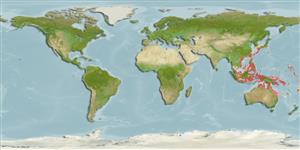Environment: milieu / climate zone / depth range / distribution range
Ecology
Marine; reef-associated; depth range 0 - 20 m (Ref. 90102). Subtropical
Western Pacific: Japan (Ryukyu Is.), Taiwan to northern Philippines, southwards to about 10°N. Further south, across the equator, iti is replaced by Diancistrus alleni.
Size / Weight / Age
Maturity: Lm ? range ? - ? cm
Max length : 7.0 cm SL male/unsexed; (Ref. 559)
Short description
Identification keys | Morphology | Morphometrics
Dorsal spines (total): 0; Dorsal soft rays (total): 74 - 85; Anal spines: 0; Anal soft rays: 58 - 69; Vertebrae: 43 - 45. Diagnosis: This species is distinguished by the following: Vertebrae 11+32-34=43-45, dorsal fin rays 74-85 (usually >77), anal fin rays 58-69, D/V 6 (rarely 7); eyes moderately large (2.4-3.4% SL); outer pseudoclasper with hook-shaped extension oriented backward at 90° angle and slightly bent outwards, with a rounded tip; inner pseudoclasper short, joined to outer pseudoclasper anteriorly, with supporter, with small hook and wide thin flap at its base; scale patch on cheek with 5-6 scale rows on upper cheek, scales on operculum only above opercular spine, 3-7 scales in 2 rows; head profile slender, broad; otolith length to sulcus length about 2.0, sulcus not inclined (Ref. 57884).
Rare species, known from a single male specimen (Ref. 34024). Solitary inhabitant of coral reef crevices to at least 20 m depth, cryptic (Ref 90102).
Life cycle and mating behavior
Maturity | Reproduction | Spawning | Eggs | Fecundity | Larvae
Schwarzhans, W., P.R. Møller and J.G. Nielsen, 2005. Review of the Dinematichthyini (Teleostei, Bythitidae) of the Indo-West-Pacific. Part I. Diancistrus and two new genera with 26 new species. The Beagle, Records of the Museum and Art Galleries of the Northern Territory 21:73-163. (Ref. 57884)
IUCN Red List Status (Ref. 130435: Version 2024-1)
Threat to humans
Harmless
Human uses
Fisheries: of no interest; aquarium: commercial
Tools
Special reports
Download XML
Internet sources
Estimates based on models
Preferred temperature (Ref.
123201): 24.3 - 29.3, mean 28.7 °C (based on 1717 cells).
Phylogenetic diversity index (Ref.
82804): PD
50 = 0.5000 [Uniqueness, from 0.5 = low to 2.0 = high].
Bayesian length-weight: a=0.00389 (0.00180 - 0.00842), b=3.12 (2.94 - 3.30), in cm total length, based on all LWR estimates for this body shape (Ref.
93245).
Trophic level (Ref.
69278): 3.3 ±0.5 se; based on size and trophs of closest relatives
Resilience (Ref.
120179): Low, minimum population doubling time 4.5 - 14 years (Assuming Fec < 100).
Fishing Vulnerability (Ref.
59153): Low vulnerability (10 of 100).
